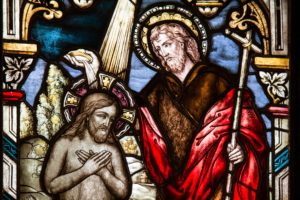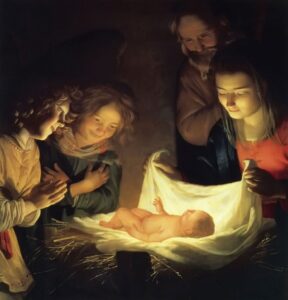Then the LORD* answered Job out of the storm and said: Who is this who darkens counsel with words of ignorance? . . I will question you, and you tell me the answers! Where were you when I founded the earth? Tell me, if you have understanding. Who determined its size? Surely you know? Who stretched out the measuring line for it? Into what were its pedestals sunk, and who laid its cornerstone, while the morning stars sang together and all the sons of God* shouted for joy? Have you ever in your lifetime commanded the morning and shown the dawn its place for taking hold of the ends of the earth, till the wicked are shaken from it? Then Job answered the LORD and said: I know that you can do all things, and that no purpose of yours can be hindered. I have spoken but did not understand; things too marvelous for me, which I did not know. (Job 38:1-7,12-13, 42:1, 3) (Bible.usccb.org)
This excerpt from the Book of Job is familiar to all of us. Job has lost everything and everyone. His body is wracked with sudden disease and pain. He is a good man. Why is this evil visited upon him? He demands answers from God. We have all been in Job’s shoes to some extent at some point in our lives. We understand Job and can empathize with his sorrow, anger, and despondency. Miraculously, God enters into a conversation with Job. The conversation does not go as Job planned. Instead of answering the question Job asks, God shows him the depth and breadth of creation – oceans, jungles, stars, galaxies. Job is overwhelmed. With humility he realizes with Whom he is speaking and how little he has appreciated everything God created simply so that man could exist. He reconciles with God, not because God answers his question, but because God answered the question buried deep in the recesses of Job’s heart that he was afraid to ask: Have you abandoned me? Do you still love me? When God entered into a conversation with Job, He was telling him that he did indeed matter. He had not been abandoned. When God showed him the entire universe in a glimpse, Job finally realized that everything was created for his benefit; everything was created to support life on this little blue-green planet, because as tiny and insignificant as we seem in comparison to the universe, we matter. We are loved.
Even if God had answered Job’s original question, Job would not have understood the answer. The Incarnation had not happened yet and Job could not have comprehended the answer. We can see Job as one of us, but he is also a type of prefiguring of Christ. Job is a good and faithful man who loves God with all his heart. Jesus is perfection and loves God perfectly and completely. As Job’s fortunes go from bad to worse, he does not curse God but instead continues to bless His Name. Even after Jesus is arrested and tortured, He remains in His Father’s Will, moving toward His plan of redemption. When Job finally he cries out to God and submits himself to His will, everything is then resurrected for him. Jesus cries out to the Father from the cross, then hands over His spirit; in three days He is resurrected. It is only through Jesus that we can make sense of suffering.
So why do bad things happen to good people? Bad things happen because sin and death entered the world when Adam and Eve, created in a state of grace, chose to sin — and the rest of us haven’t done any better. There is no such thing as a private sin that doesn’t affect anyone else. The sin of a single person affects everyone. Because sin creates disorder, there is a ripple effect everywhere, even in nature itself.
But this isn’t cause for despair because God has fulfilled His promise. The Incarnation – God becoming man has happened and that has changed everything. When Jesus chose to take on human form and experience every single human frailty and hardship, He gave value and meaning to these experiences. As a baby in Bethlehem born in shivering cold, hiding in Egypt away from all family connections, losing his beloved St. Joseph, hungry for 40 days in the desert, chased out of town for his teaching, betrayed by one of his closest companions, abandoned by his friends, maligned by people for speaking the truth, tortured and put on a cross for a crime He did not commit, He experienced every possible suffering that can be experienced.
He did not come to end the human suffering in the world. He entered into it with us, immersing Himself into the entire human experience, using every moment of it to glorify God and thus giving value and meaning to all of it. So, when we experience injustice and suffering, we can offer these up to Jesus as prayers. As we ask Jesus to join our suffering to His suffering on the cross, He takes this offering and gives it redemptive value. No longer is suffering meaningless pain, but a gift offered to the Father for the salvation of souls. When we give this gift with love, it is then we become most like Jesus. The angels rush to our side to comfort us, our Blessed Mother embraces us, and Jesus makes His home in our heart and gives us His peace. It is the gifts of love, given with a generous heart, that store up our treasures in Heaven, treasures that will never pass away. Suffering is therefore not an abandonment by God, but an invitation to imitate His Beloved Son.
Thank you to Bill Fuller for giving me permission to share this beautiful photograph of the desert sky which inspired this post.






Thank you for writing this powerful reflection on the story of Job. Your words bring a deeper understanding of how God shows us his love and how to find it.
During these days of strife in the world so many forget that God has a plan for us, that He hasn’t abandoned us and that we are so loved by him that He died for us. In the midst of hardships and crosses that we bear, we sometimes lose sight of God in our hearts. He is always with us and is carrying us in those moments when we are broken and weak.
Yes, He does have a plan even when we fail to see it.
So beautifully thought through. As The Trinity is Love,our cooperation allows us to transform our sin and suffering into love for the purpose of God’s will!!!to take joy in Gods will is to find peace.
Amen.
What a great message, for such a time as this.
Blessings,
Mary Roy